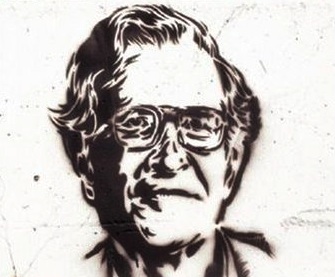Posted on November 6th, 2008 at 10:39 pm by Steve

Radical Priorities, Pages 119-120:
In attempting to assess a new Administration in the United States, it is important to bear in mind the extraordinarily narrow spectrum of political discourse and the limited base of political power, a fact that distinguishes the United States from many other industrial democracies. The United States is unique in that there is no organized force committed to even mild and reformist varieties of socialism. The two political parties, which some refer to, not inaccurately, as the two factions of the single ‘Property Party,’ are united in their commitment to capitalist ideology and institutions. For most of the period since the Second World War, they have adhered to a ‘bipartisan foreign policy,’ which is to say, a one-party state as far as foreign affairs are concerned. The parties differ on occasion with regard to the role of the State, the Democrats generally tending to favor slight increases in state intervention in social and economic affairs, the Republicans tending to favor greater emphasis on private corporate power. Thus, under a Democratic Administration, there are likely to be some moves toward ‘welfare state’ policies along with a more aggressive foreign policy, as the State pursues a more interventionist program at home and abroad. But these distinctions between ‘liberals’ and ‘conservatives’ are only marginal in their significance and are at most slight tendencies rather than serious alternatives.
The domestic sources of power remain basically unchanged, whatever the electoral outcome. The major decision-making positions in the executive branch of the government, which increasingly dominates domestic and foreign policy, remain overwhelmingly in the hands of representatives of major corporations and the few law firms that cater primarily to corporate interests – thus representing generalized interests of corporate capitalism as distinct from parochial interests of one or another sector of the private economy. It is hardly surprising, then, that the basic function of the State remains the regulation of domestic and international affairs in the interest of the masters of the private economy, a fact studiously ignored in the press and academic scholarship, but apparent on investigation of the actual design and execution of policy over many years.
In fact, if some Administration were to depart in a significant way from the interests of highly concentrated private corporate power, its behavior would quickly be modified by a variety of simple techniques. Basic decisions concerning the health and functioning of the economy – hence social life in general – remain in the private sector. Decisions made in this realm set the conditions and define the framework within which the political process unfolds. By modifying the economic factors under their control, business interests can sharply constrain actions within the political sphere. But the issue rarely arises, since, as noted, the government, including those who manage the state sector of the economy, remains basically in the hands of private capital in any event.
Extra-governmental sources of ideas and programs are also, naturally, dominated by those who control the basic institutions of production, finance, and commerce.
He wrote those words in an article examining the prospects of an incoming Democratic Administration… in 1977.